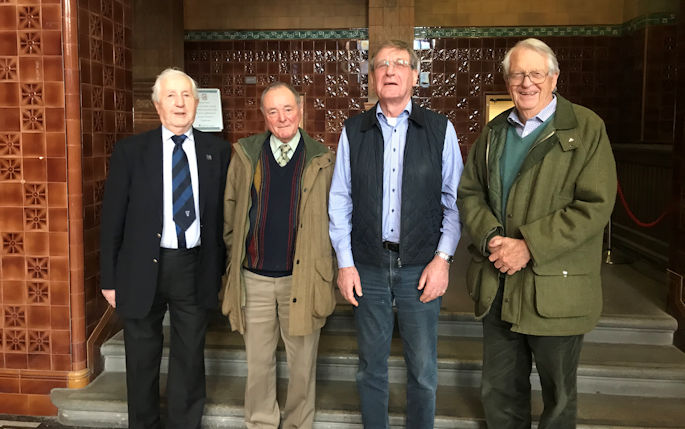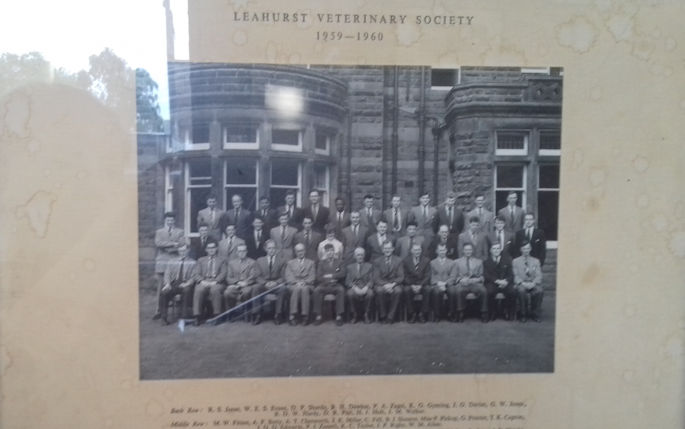Vets reunited: Veterinary Class of 1960 (LX Club)

The Veterinary Class of 1960 came together to celebrate their 60 year anniversary since graduating from the University of Liverpool. Below, alumnus and Emeritus Professor, Prof. Ron Jones FRCVS OBE reflects on the time his and his peers spent studying all those years ago.
In October 1955 30 people met in the Faculty of Veterinary Science in Bedford Street North. There were 28 men and two women in the year and of the men two were from Commonwealth countries and two were older as they had completed their National Service. Following registration the rest of the week was devoted to the Freshers’ Conference where we were invited to join a variety of clubs and societies and a variety of social events plus a welcome talk from the Vice-Chancellor, Sir James Mountford. There were very few places in halls of residence for men students at Derby Hall and Greenbank so the majority lived in lodgings, with women living in Rankin or University halls
Looking back
The social scene at that time was very different to that of today. There was only one TV Channel (BBC), no fax, no internet, so no e-mails or texts, with communication by ‘phone or post. There were no credit or debit cards so cash access was either by post office savings bank or bank arrangements from home town banks. Virtually all of the trains were steam hauled and student luggage was sent passenger luggage in advance delivered to its destination.
Our first year in Vet School
The first year course was mainly the four sciences of Botany, Chemistry, Physics and Zoology as there was no exemption in contrast to Medicine and Dentistry. As most of the year had gained these subjects at A level at a higher standard it meant that very little effort was required. Botany lectures were well delivered by Dr Stanley Walker and practical classes by James Ratter, the son of Sandy Ratter who was the Veterinary Investigation Officer in Liverpool. Chemistry lectures were given by Dr Geoff Skirrow. Physics classes were in the charge of Richard Ablett who was a character who had published a book on physics for medical students but was out of print.
Zoology lectures were delivered to large classes, including science students, by Dr Noel Hynes and were not at all popular with veterinary students. In addition there were lectures in Osteology from Mr (Jimmy) Dransfield the whole of the first lecture was devoted to the equine scapula with borders, edges, surfaces and muscle attachments. In addition the only real veterinary contact was a weekly lecture from Mr (later Professor) J O L King on animal management and the initial lectures were on colours and markings of horses. This was a very interesting and practical course which culminated in a month’s vacation course at the end of the second year at Leahurst, followed by a practical examination.
Celebrating our first year exams
The first year exams were in general a success for the majority but we did say farewell to two students. There was a great deal of excessive celebrations by the successful students including visits to disrupt a nude show at the Pavilion theatre, a camping weekend in the Isle of Man and a pub crawl which ended in a raid on Rankin Hall. This was reported back to Professor J G Wright who summoned all the male students to administer a sever reprimand. Two of my fellow house mates and myself left after the pub crawl so when asked to stand and leave if not involved we all jammed in the doorway in our haste to leave. It is rumoured that he would have asked individuals to leave the University if about half of the year were involved. They received a severe reprimand and warning and he was quoted as saying ‘gentlemen you are on the top of a very slippery slope.’

Reflecting on our exams and lecturers
The vacations were devoted to compulsory work with animals and I worked on large dairy and beef farms in addition to the family holding. Second year started with a flurry as we were no longer first years. Lectures in Anatomy on soft tissue were given by Mr H V (Cherry) Hughes together with dissection of ponies. This was done in the dissection room which had a very strong smell of formaldehyde. We were hampered for the first term by a shortage of out of print dissection guides which did not come available until January after the 3rd year had completed their 2nd BVSc exams. Light relief was obtained, when staff left the room, by the throwing of large pieces of muscle at your fellow students. Histology was taught in the Department by Dr Allan Wright otherwise known as ‘Trog’ with a lecture and practical class on a Saturday morning which often did not get full attendance. Physiology and biochemistry lectures were with fellow medical and dental students. The first of the Physiology lectures were delivered by Prof R A Gregory, FRS and were very interesting and well presented. Further physiology lectures were delivered by other staff but neurophysiology was very difficult to understand. Additional veterinary lectures were given by Mr Alan Singleton on a Wednesday morning and invariably started late with ‘the tunnel’ as the regular excuse. This was followed by the practical class with muscle twitches and heart function in frogs using smoked drums and varnish.
Biochemistry lectures were given by Dr T W Goodwin, known as ‘fatty acids’ Additional veterinary lectures were given by Dr John Paterson which added more interest to the subject. The second year course was, in fact, four terms with the 2nd BVSc exam in January so it was home for Christmas on the revision trail accompanied by masses of text books and lecture notes.
On the Monday it was straight on to Pathology classes which were tinged with a note of sadness as we had lost five members of the year to the exams. We also collected people from the previous year. Most of Pathology was taught by Dr G O Davies the co-author of the text book and whose favourite phrase was ‘not infrequently’. Dr Joan Dixon was responsible for the practical classes and her catch phrase was ‘when I was at UCH’. Bacteriology was taught by Dr Tony Buxton in a professional manner and by Professor D L (Dai) Hughes (‘Smooth Hughes’) who always addressed the class as Miss Pickup and gentlemen. Professor Hughes also delivered lectures on pathology of mammary tumours and on referring to calcification uttered words that will always be remembered by the year – hence the phrase ‘tough titty old man’. Parasitology was taught at the Tropical School by Dr Michael Clarkson (helminthology) and Dr Lavoipierre (entomology). The latter’s classes were not very popular and he gained the nickname of ‘Bog Pete’ Pharmacology was taught in the Medical department and after a few lectures by a number of Wilsons, including the Professor Andrew, most of the interesting course was delivered by Mr John Sanford. The pharmacology examination was held mid-term in October and was memorable in that it was on my 21st Birthday.
The other professional exams were held at the end of the Easter term and produced no upsets or surprises. So on to the final four terms devoted to clinical subjects based on the Small Animal Hospital in Pembroke Gardens. The chief technician, in charge was Dave Douglas who was a fountain of knowledge. Mr Shuttleworth was the senior academic and taught mainly orthopaedics in horses and small animals and always addressed the class as ‘you men’. He was a real gentleman, an excellent surgeon and an accomplished equine artist. The lecturer was Mr Leslie Arnall who had the somewhat infuriating habit of when there was no surgery of ‘springing’ lectures on us on small animal medicine. Miss Maureen O’Malley was the senior demonstrator and had main responsibility for the free clinics. It would be true to say that small animal clinical work was not a high priority for the majority of the year and not taken too seriously and there lots of time spent on the beach at Freshfield, Cheshire Agricultural Show and Chester Races amongst other distractions. Summer vacation was devoted mainly to ‘seeing practice’ and veterinary related activities. David Walker and I went to the Copenhagen and Hanover veterinary Schools.
Our final year
So back in October to Leahurst and real veterinary clinical work - we had made it after four years. Every morning at 9.00am, except Fridays, but including Saturdays Professor J G Wright lectured to the whole year. They were unique in that he never used a note and began exactly where he left off.
Surgery lectures were also given by Mr Paul Neal and medicine lectures mainly by Mr Jim Pinsent and by Mr Harry Rithchie. The Pinsent lectures were usually at 4.00pm and open-ended particularly when the Welsh ‘huwl’ took over. These three lecturers also ran the veterinary practice on a rota basis.
Lectures in preventive medicine were given by Professor E G White who also required essays and student presentations. To the majority of us who were ‘budding James Herriotts’ they were not well received. Dr Frank Jordan gave lectures on legislation and poultry medicine.
A great deal of student time, when not on the practice rota was spent observing surgery on horses by Professor Wright. Horses were cast by hobbles in charge of Ben Burrows the chief technician who was also very adept at dealing with bovine foot problems. Once cast the horses were anaesthetised with intravenous chloral hydrate topped up with a barbiturate, which had a slow recovery and often interfered with lunch. Cattle surgery was usually abdominal or caesarean sections which often provided nocturnal distractions. All of the students lived at Leahurst with the exception of a few married ones. The warden was Dr JOL King and Miss Olive Harley was the housekeeper. The standard of catering was the source of regular complaints but was tolerable on Tuesdays and Fridays when Mrs Tilston was the cook.
This year not content with a ‘brush with authority’ in its 1st year also managed one in final year. Male students lived in the two hostel annexes. In the older one the heating system was poor and it was boosted by metered electric fires. The students living in that building began to complain once the weather was cold. A staff member went to collect money from the meters and got very little which initiated an enquiry as the meters had been by-passed. Disciplinary action followed but we were allowed to progress on the course. Summer time saw frantic revision and library sessions. Final written exams of eight papers, which were three hours long, were taken over four days in Liverpool. Oral and practical exams followed in the next week. Results were read out by Professor Wright in Liverpool who managed to announce that one person had passed –’sorry failed’. There was a final year dinner that night at Leighton Court and the next day we all departed on our separate paths, with very mixed emotions after five years. Graduation followed a few weeks later and admission to membership of the Royal College of Veterinary Surgeons by the President, Sir John Ritchie.